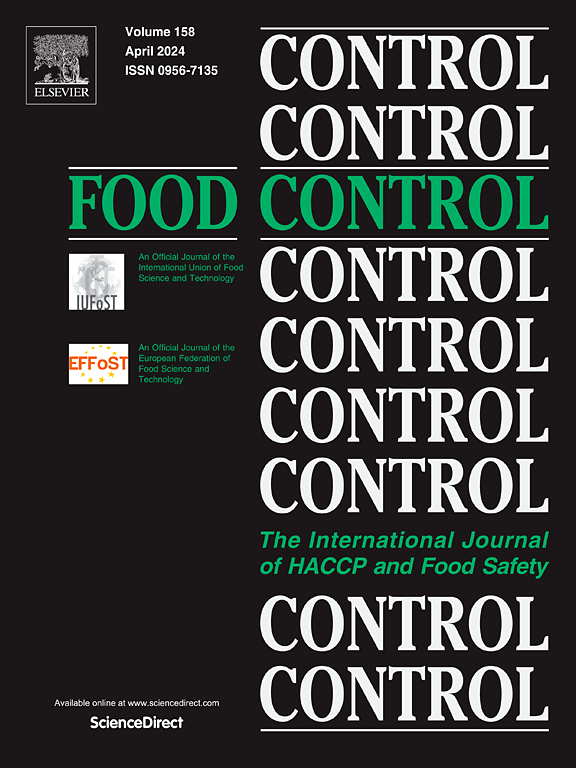Cinnamon essential oil causes cell membrane rupture and oxidative damage of Rhizopus stolonifer to control soft rot of peaches
IF 5.6
1区 农林科学
Q1 FOOD SCIENCE & TECHNOLOGY
引用次数: 0
Abstract
Rhizopus stolonifer is the major cause of soft rot in peaches, which leads to rapid decay and shortens the shelf life. In this study, we investigated the inhibitory mechanism of cinnamon essential oil (CEO) against R. stolonifer, evaluated its control efficacy of soft rot of peaches. The results showed that CEO treatment damaged the cell membrane of R. stolonifer, resulting in a high increase in extracellular conductivity and protein content. CEO causes the mycelium to crumple, as well as plasmalemma wall separation, the ablation and absence of some organelles. CEO also increased the contents of malondialdehyde (MDA) and hydrogen peroxide (H2O2), and the accumulation of reactive oxygen species (ROS) of R. stolonifer, thus inhibiting the growth of R. stolonifer. In addition, we found that 0.8 mL L−1 CEO fumigation significantly reduced the incidence of soft rot in peaches without any adverse effect on fruit quality. Therefore, our findings provide theory and scientific guide for the application of CEO in controlling soft rot of peaches in postharvest storage. CEO could be used as a natural fungicide to reduce fungal decay in fruits.
肉桂精油可导致匍匐茎根瘤菌细胞膜破裂和氧化损伤,从而防治桃子软腐病
匍匐茎根瘤菌是桃子软腐病的主要病因,它会导致桃子迅速腐烂并缩短货架期。本研究探究了肉桂精油(CEO)对 R. stolonifer 的抑制机制,并评估了其对桃子软腐病的防治效果。结果表明,CEO 处理会破坏 R. stolonifer 的细胞膜,导致细胞外传导性和蛋白质含量增加。CEO 会导致菌丝皱缩,以及质膜壁分离、某些细胞器消融和缺失。CEO 还会增加 R. stolonifer 的丙二醛(MDA)和过氧化氢(H2O2)含量,增加活性氧(ROS)的积累,从而抑制 R. stolonifer 的生长。此外,我们还发现,0.8 mL L-1 CEO 熏蒸剂可显著降低桃子软腐病的发病率,且不会对果实质量产生任何不利影响。因此,我们的研究结果为应用 CEO 控制桃子采后贮藏中的软腐病提供了理论和科学指导。CEO 可以作为一种天然杀真菌剂来减少水果的真菌腐烂。
本文章由计算机程序翻译,如有差异,请以英文原文为准。
求助全文
约1分钟内获得全文
求助全文
来源期刊

Food Control
工程技术-食品科技
CiteScore
12.20
自引率
6.70%
发文量
758
审稿时长
33 days
期刊介绍:
Food Control is an international journal that provides essential information for those involved in food safety and process control.
Food Control covers the below areas that relate to food process control or to food safety of human foods:
• Microbial food safety and antimicrobial systems
• Mycotoxins
• Hazard analysis, HACCP and food safety objectives
• Risk assessment, including microbial and chemical hazards
• Quality assurance
• Good manufacturing practices
• Food process systems design and control
• Food Packaging technology and materials in contact with foods
• Rapid methods of analysis and detection, including sensor technology
• Codes of practice, legislation and international harmonization
• Consumer issues
• Education, training and research needs.
The scope of Food Control is comprehensive and includes original research papers, authoritative reviews, short communications, comment articles that report on new developments in food control, and position papers.
文献相关原料
公司名称
产品信息
索莱宝
phosphate buffer solution
 求助内容:
求助内容: 应助结果提醒方式:
应助结果提醒方式:


